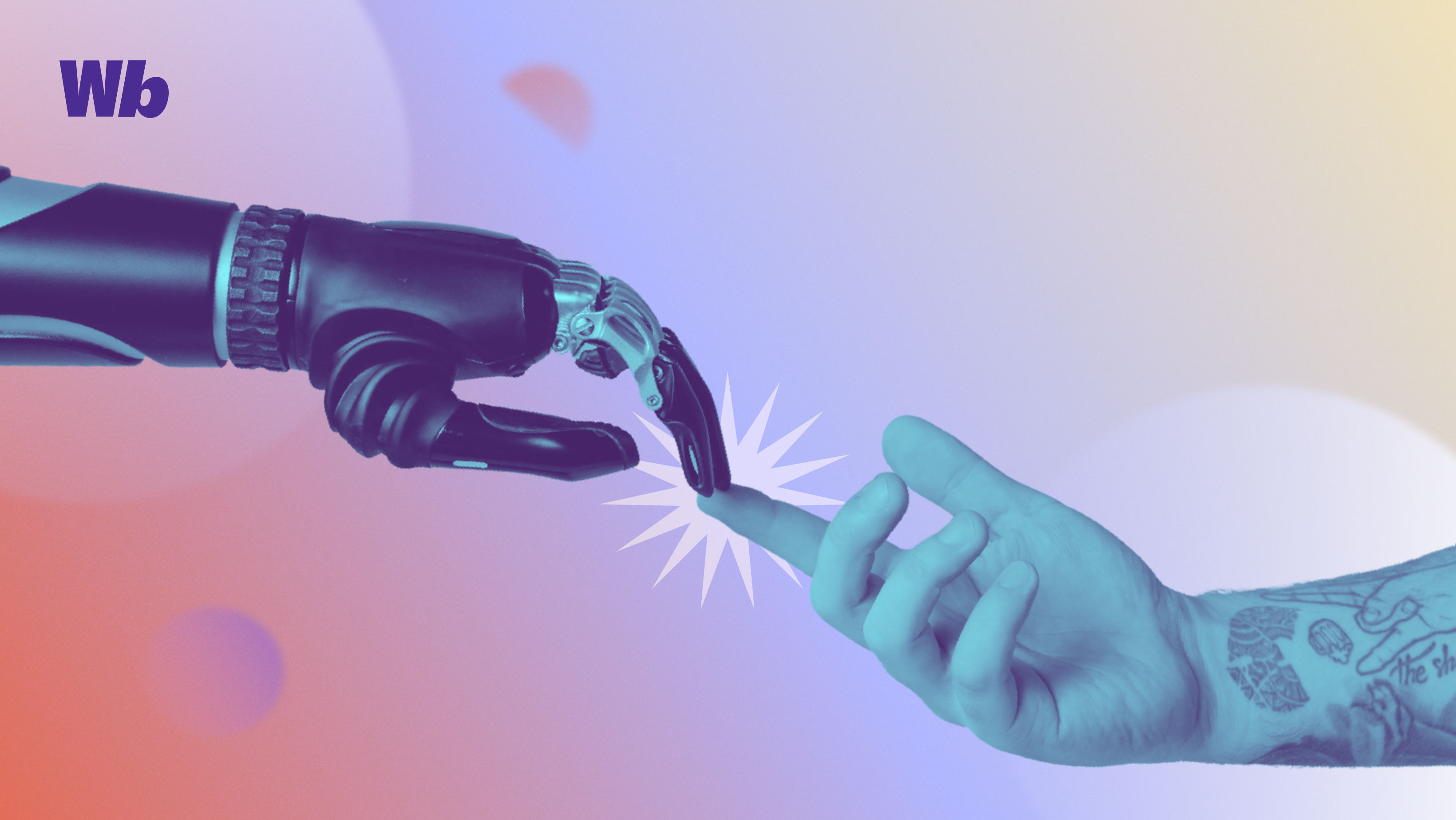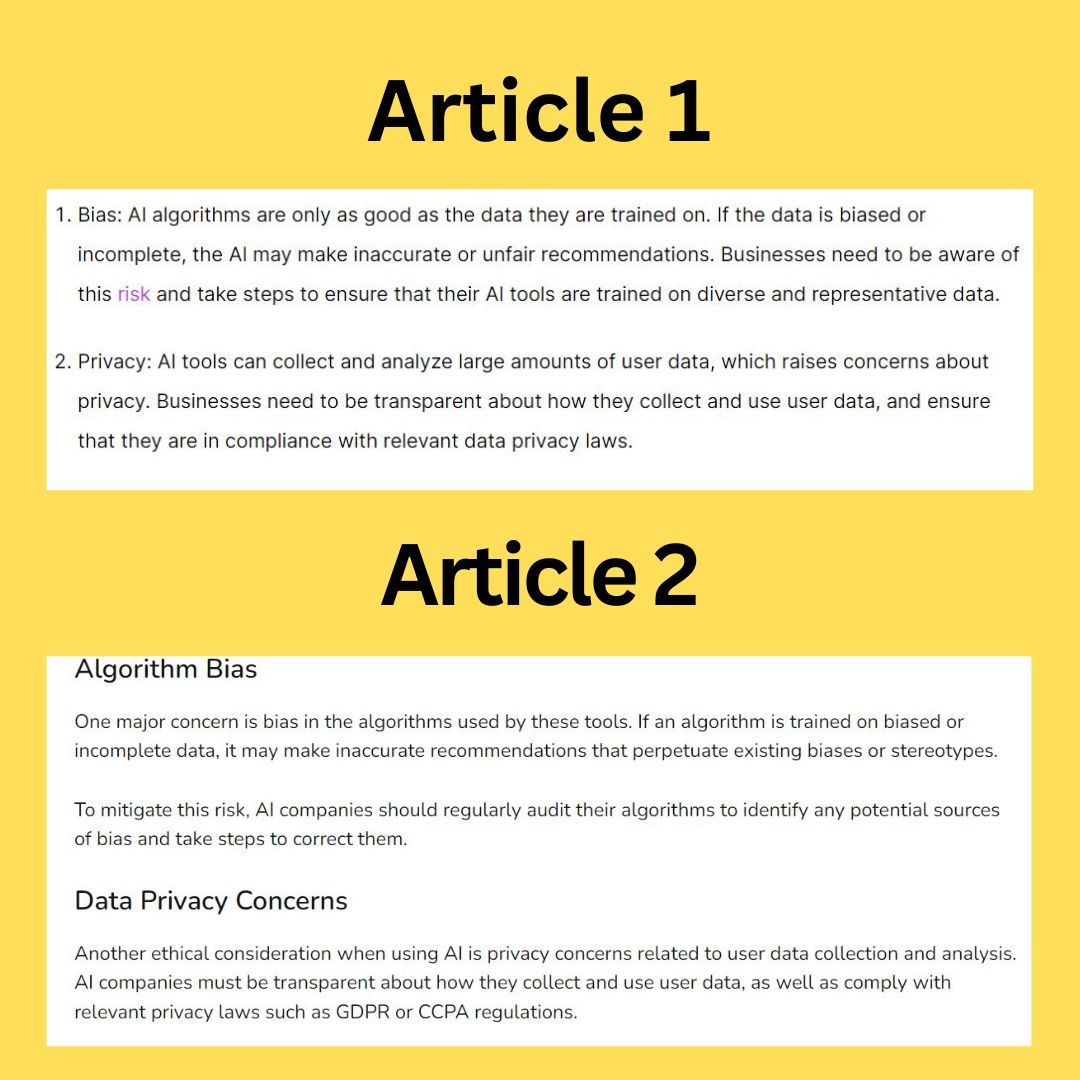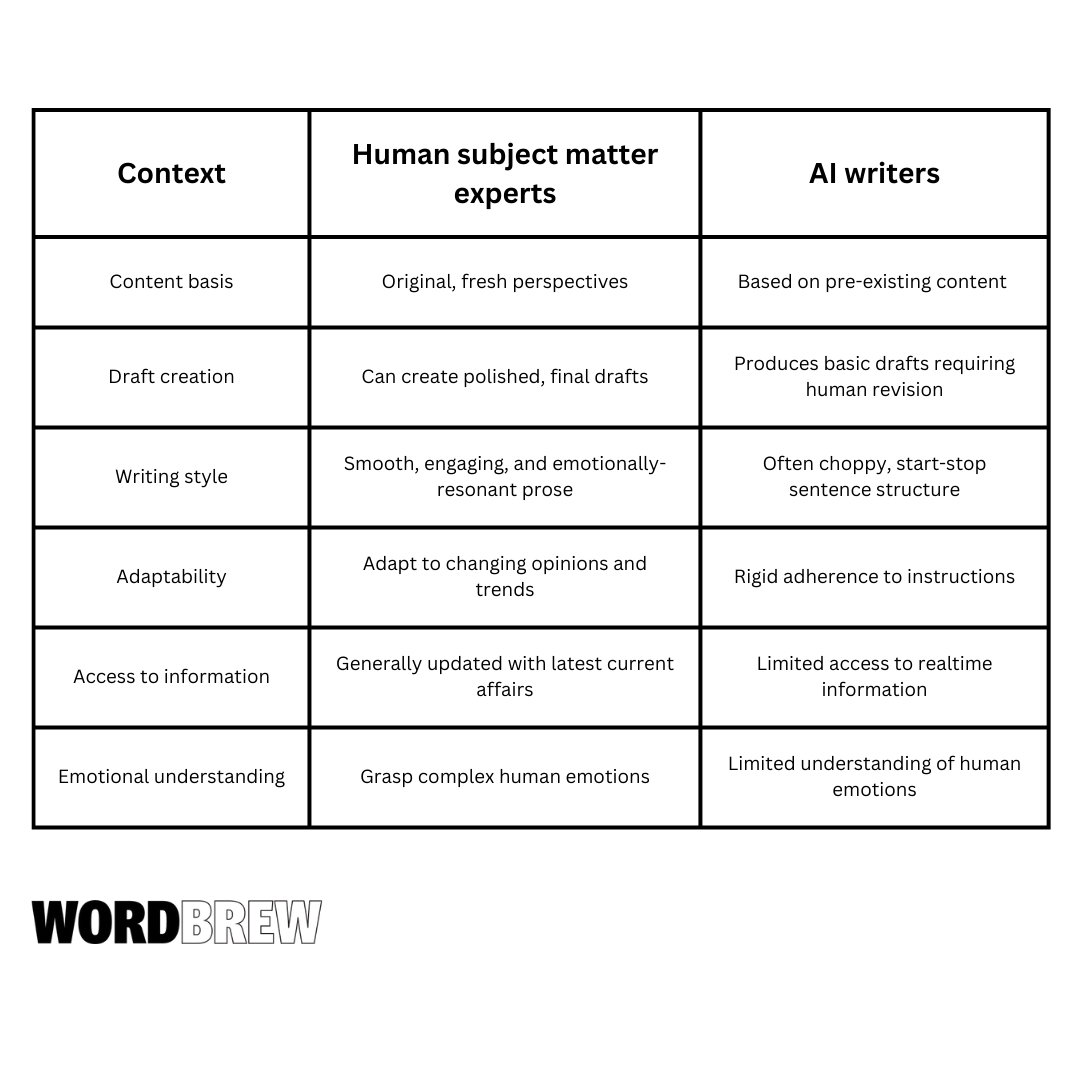Table of Contents
- Home
- »
- Hybrid Content
- »
- Will AI replace writers? The truth you need to hear
-
Jack Ryder
- 7 minutes read time
Will AI replace writers? The truth you need to hear
- Home
- »
- Hybrid Content
- »
- Will AI replace writers? The truth you need to hear
Will AI replace writers? The truth you need to hear
Table of Contents

It’s undeniable that the content marketing landscape is evolving. We’re seeing a significant shift from mediocre to opinionated, experience-based work. Readers now lean towards valuable, insightful content, compelling search engines like Google to prioritize distinctive and meaningful pieces over surface-level content.
Unless you’ve been living under a rock, you’ll have heard of, or already use generative AI—this promised land of writing content in seconds. So, with the shift towards valuable and opinionated content, the question arises: Will AI replace writers?
We’ll explore AI’s potential and capabilities, see if it can really replace writers, and analyze how it impacts content marketing.
Tl;dr
- Search engines are now prioritizing valuable, insightful, and meaningful content over basic, keyword-stuffed pieces.
- Generative AI, like ChatGPT, creates content quickly but tends to produce surface-level work, often needing extensive human editing.
- AI’s current limitations include out-of-date information, a rigid response to instructions, and lacking the emotional depth that human writers provide.
- Despite its shortcomings, AI is beneficial in content creation processes including data gathering, organizing info, grammar checks, and style suggestions.
- The future of writing is hybrid content—AI-generated drafts enhanced by human writers, maintaining depth, emotion, and resonance with readers.
The shift in content marketing
In their own words, “Google’s automated ranking systems are designed to present helpful, reliable information that’s primarily created to benefit people, not to gain search engine rankings.”
Gone are the days of stuffing your content full of keywords, hoping you’ll rank for as many as possible and drive loads of meaningless traffic to your website. Google and other search engine algorithms are too smart for that.
The internet, particularly search engines, exists to give people access to the information they need when they need it, so it’s unlikely this pivot to value-driven content is just a trend. How do we know this? Because Google quite literally publishes what they do and do not want content to look like.
In-depth content coverage has been a Google ranking factor for years. Now, content marketers and writers are told by Google to ask themselves the following things:
- Are you using extensive automation to produce content on many topics?
- Are you mainly summarizing what others have to say without adding much value?
- Are you writing about things simply because they seem trending and not because you’d write about them otherwise for your existing audience?
- Does your content leave readers feeling like they need to search again to get better information from other sources?
Source: Google
If you answer yes to any of these, Google won’t like your content.
Basic, search-engine-focused content is out. In-depth, purposeful, value-driven, expert, and opinionated content is in—and by all accounts, it’s here to stay.
AI in content creation: The current scenario
Unsurprisingly, AI adoption went through the roof when ChatGPT launched—no app has reached 100 million users faster.
Content marketers and writers everywhere were flocking to write blog posts in seconds (46% of organizations using AI use it for marketing and communications). However, it quickly became apparent that it wasn’t all sunshine and rainbows.
As we know, Google isn’t a fan of surface-level, regurgitated content. This is the first stumbling block for AI companies because they are trained using content that has already been created. So, in its current form, AI technology is inherently restricted to creating tweaked versions of existing content—hardly ticking Google’s unique content box, is it?
Right now, AI can muster up a basic draft that requires extensive human intervention from a subject matter expert. Worse, this intervention isn’t just a cursory glance for grammatical errors. It involves substantial revision, fact-checking, and ensuring the use of nuanced and appropriate language.
- AI training data is existing content
- AI can only produce altered versions of already-written work
- AI can create an okay first draft, but it needs extensive human editing
- AI doesn’t tick the boxes for people-first, high-ranking content
An example of AI-written content spotted in the wild
Here are two brands, who’ll remain unnamed, that have used AI to produce content on the same topic:

See how they’re listing the same things in slightly different words and a varied layout? That’s a classic sign of AI-generated content with no human intervention.
Challenges with AI writing
Unpleasant writing style
The writing style of AI often leans towards a choppy, start-stop sentence structure, which simply falls flat. On the flip side, skilled human writers craft smooth, engaging, and emotionally resonant prose that draws readers in.
Example of a product description written 100% by AI:
Achieve a new level of comfort and style with our MarvelFlex Gym Leggings. Crafted to empower your every move, whether you’re hitting the gym, going for a run, or attending a yoga class. These leggings are designed to elevate your fitness experience, allowing you to focus on your goals while we take care of the rest.
Analysis of this example:
- Includes generic language
- Vague and missing product specs
- Lacks originality
- Doesn’t include industry-specific language
- Doesn’t speak in the brand’s TOV
- Doesn’t include keywords
Example of AI copy edited by a subject matter expert writer:
MarvelFlex High-Waisted Gym Leggings
Sweat the effort, not the heat. Powered by MarvelFlex four-way stretch fabric, these squat-proof leggings are ultra-breathable to ensure air flows as freely as you move. The material wicks away sweat at lightning speed so you can squat, jump, and sprint without distractions.
- MarvelFlex fast-drying fabric
- Flattering high-rise waistband
- Hidden pocket for your card and keys
Analysis of this example:
- Seamlessly integrates relevant and specific keywords
- Formatted in a reader-friendly way
- Focuses on the standout product specs
- Includes benefit-rich bullet points
- Captures the unique brand voice
- Incorporates industry-specific language
Out-of-date information
Without live internet access* AI is further handicapped, unable to stay up-to-date with the latest global happenings, evolving opinions, and emerging trends. Users want to read the most relevant and up-to-date content, and that’s what Google wants to serve them. Unfortunately, AI technology can’t present that information because they haven’t learned it yet.
In the rapidly evolving world we live in, where content is instantly accessible, this limitation of AI can’t be understated.
*Google claims Bard is online, but it’s still known to hallucinate and give extremely inaccurate information.
Rigid to instructions
Creative writing is about thinking outside the box to produce unique, original, engaging copy. Human writers are only limited by their minds and ability to research, whereas generative AI is bound by the instructions given to it.
This limitation leads artificial intelligence to write bland content with little depth. When prompting AI tools, you’ll notice they struggle following word count instructions, usually returning much less than what you asked for. Plus, they only include the specific information relating rigidly to your prompt rather than thinking laterally and exploring the topic from other angles.
The irreplaceable human touch
Despite facing these challenges, AI does hold the potential to assist the creative process. As discussed, it can produce workable drafts, albeit with significant human assistance. However, 100% AI-generated content is a way off.
As it stands, AI writing lacks the human touch, which is irreplaceable—for now. Human writers bring a depth of understanding of intricate emotions and cultural nuances and the ability to adapt swiftly to changing opinions and trends, which AI can’t offer.
For a successful creative process, you require human intuition, critical thinking, storytelling, and human experience. In their current form, AI tools just can’t foster the emotional connections human writers can.

The role of AI in assisting writing
Currently, 76% of marketers using AI are using it to produce basic content and write copy, so clearly, AI can form part of the human writing process. However, the key here is that it is being used for basic content creation.
Although AI’s potential is huge, you need to be certain you’re preserving content integrity. With its limitations, AI has the potential to diminish user experience and create repetitive content, meaning if you don’t maintain high standards, you risk Google penalizing your AI content.

Potential uses for AI writing
AI makes for a great assistant—that much is clear. But what can you use AI for without making your content look lifeless?
Here are a few ways in which you can use AI for content creation:
- gathering data
- organizing information
- providing a basic structure for writers to build upon
- grammar checking
- style suggestions
- optimizing content
By making the most of what artificial intelligence does well, writers can focus on the creative and strategic aspects of writing while streamlining their process and becoming more efficient.
The continuous evolution of AI
Although AI technology has its limitations for creative writing, it is evolving at incredible speed. Natural Language Process (NLP) is improving, and AI is becoming better at understanding and processing human language. However, the nuances, emotions, and creativity that human writers bring to the table are still unmatched, and will be for the foreseeable future.
Therefore, if prompted effectively, writers should be able to improve the initial drafts that AI produces, meaning less editing and improvement. Overall, there can be harmony between human writers and AI. It doesn’t have to be one or the other.
Will AI replace writers? Looking towards the future
In its current form, AI can not replace human writers. If it did, the internet would be full of regurgitated and non-opinionated content. However, AI is continuously evolving, and the future may hold advancements that could refine the ability of AI to produce human-esque content.
Overall, the essence of quality content lies in human insight, emotion, and creativity—this will always be paramount. Until AI-generated content can replicate human creativity and emotional intelligence, human-led writing will win.
However, the importance of AI in the creative writing process shouldn’t be understated. According to IBM, 35% of companies are training and reskilling their teams to use AI automation tools, so writers and content marketers should be harnessing the power of AI and enriching what it produces with human interference.
Writers should utilize AI, not replace themselves with it
Currently, there are two clear ends to the AI adoption spectrum. There are die-hard writers who refuse to embrace AI technology and deny that it’ll ever replace them. Alternatively, there are tech-driven content marketers who won’t write another word themselves. The reality? There’s a middle ground between AI and human writers that can produce the holy grail—hybrid content.
All the data points towards hybrid content (AI-produced copy edited by a subject matter expert):

Sources: Capgemini, Insider Intelligence, IBM, Backlinko, SimiliarWeb
So, while AI is a powerful tool with the potential to aid the content creation process, the role of human writers remains central and crucial. The depth of human understanding, emotional insight, and the ability to adapt to the ever-changing global landscape ensures the production of content that isn’t only valuable, engaging, and deeply resonates with readers.
Completely replacing human writers with AI isn’t on the horizon. The human element in content creation is, and will continue to be, indispensable. The future of writing lies in the collaboration of AI and human writers—hybrid content.
So, writers, you can rest easy, but we recommend utilizing AI’s potential to level-up your work. And, to the content marketers out there, don’t just rely on AI, it’s not the holy grail and can seriously harm your brand if used incorrectly.